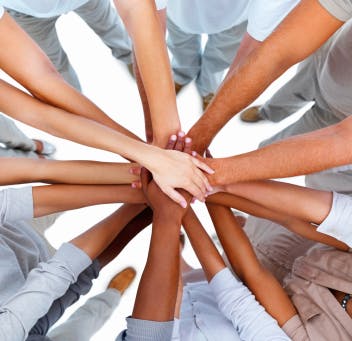Employees with more friends at work are more engaged, according to the Fall 2014 MoodTracker Report released by Globoforce.
Only 28 percent of employees who reported having no friends at work were engaged, while 69 percent who reported having at least 25 friends were highly engaged.
The implications are clear: We need more friends at work.
5 reasons why relationships are vital
One of the most effective ways to help build peer relationships are through peer-to-peer recognition programs.
Peer-to-peer recognition is appreciation that’s exchanged between two employees. Whether the appreciation is displayed through a simple, “You did an amazing job!” or a small gift, peer-to-peer recognition can greatly improve employee happiness in the workplace.
But relationships’ impact on the workplace reaches far beyond just happiness, Globoforce found.
Here are five (5) reasons why peer relationships are vital in the workplace:
1. It increases loyalty to the company
According to the Globoforce report, employees who have friends at a company are more likely to stay. In fact, 64 percent of employees with six to 25 friends at work are more likely to stay loyal to their employer.
Employees aren’t loyal to companies, they’re loyal to the people in them. Create a recognition program to help your team bond over the victories of one another. Reward employees who participate the most to show them you value their dedication to the company.
2. It improves job satisfaction
Peer involvement makes a big difference in job satisfaction too, according to the report. Employees who had peers celebrate their milestones with them are 17 percent more likely to love their job, and 31 percent more likely to love their company.
Employees with several friends at work are also more proud of their companies; 50 percent of people with at least 25 friends reported taking pride in where they work.
When employees are happy at their job, invite them to say so. Encourage employees to share what makes them happy at work, whether it’s working with specific team members or other factors about being a part of the team that make work enjoyable.
3. Employees feel more valued at work
Workers are 24 percent more likely to feel appreciated if they worked in companies where co-workers were included in their anniversary, the MoodTracker report found.
Always involve the whole team when celebrating milestones, anniversaries and birthdays. Don’t limit your milestones to just years of service, either. Celebrate the completion of difficult projects, new skills and competencies obtained, and other performance metrics.
When employees know they matter to their team members, they’re motivated to work harder. In fact, a study by TinyHR reveals peer camaraderie is the number one reason employees go the extra mile.
4. Employees need support through good times and bad
Building peer relationships in the workplace will result in higher emotional engagement, good memories and laughter, Globoforce found. some 73 percent report laughing with their co-workers so hard, they almost cried.
Employees are willing to provide one another a shoulder to cry on, too. Sixty-one percent of employees say support from colleagues has helped them get through a hard time.
Keep an eye out for employees who support their peers the most. When in doubt, ask employees who has been most helpful to them. Not only will you have a better idea of which employees are “the glue” holding your organization together, but you can become more aware of top performers’ strengths.
5. Employees want to be recognized by their peers
Employees want their peers to notice their hard work, just as they want to recognize the work of their peers.
According to TinyHR, 44 percent of employees will recognize their peers when given the tools to do so. Additionally, 58 percent of the happiest employees are more likely to cheer their cohorts on in the workplace.
Provide a way for employees to recognize one another through either small rewards or a platform to post public thank you notes. You’ll notice more thank you notes roll in as more employees realize the impact a few kind words can have in building relationships and creating a sense of belonging.
Supporting friendship growth
Of course, there is no way to make friendships happen. Genuine relationships happen organically and grow over time, as people share interests and work toward goals alongside one another.
You can support this growth. Just give employees the tools they need to recognize one another.
